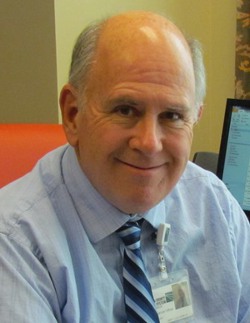Lincoln County Health System CFO Mike Harbor discusses his approach to leadership in an industry facing an uncertain future.
Last month, Mike Harbor became CFO of Fayetteville, Tenn.-based Lincoln County Health System. Mr. Harbor has worked in the healthcare industry for 37 years and most recently served as CFO of Hardin Medical Center in
 Lincoln County Health System encompasses a 59-bed acute-care hospital, a freestanding rehabilitation and wellness center, a 240-bed licensed nursing home, a home health and hospice agency and an ambulance/EMS service.
Lincoln County Health System encompasses a 59-bed acute-care hospital, a freestanding rehabilitation and wellness center, a 240-bed licensed nursing home, a home health and hospice agency and an ambulance/EMS service.
Here, Mr. Harbor talks about his decision to join the health system and his approach to leadership in an industry facing an uncertain future as the Patient Protection and Affordable Care Act reshapes how healthcare is paid for and delivered.
Question: What drove your decision to join
Mike Harbor: I was drawn to this hospital because of the community, the people here and all the good values that this organization stands for. I'm impressed with the hospital, the management team, the services offered and the board. I feel very comfortable with this organization.
Q: As the new CFO, what are your plans and priorities for the health system? Any notable projects or initiatives you're excited about?
MH: As CFO, my primary responsibilities help to ensure the financial viability of the hospital. First, by increasing revenues at the hospital, we can allow for future financial challenges, as well as future growth opportunities. We can do that by providing additional services that the community needs or by improving our reimbursement for the services that we already provide. Another area of responsibility is cost management. This is done by increasing efficiencies and lowering the amount that we are paying for supplies and services.
The third responsibility that's vital for financial viability of the organization is making improvements to the balance sheet. That would include turning receivables into cash. Also, debt management is critical to a hospital's financial health. I believe hospitals have to keep moving forward with revenue enhancement because there are so many pressures on us with reimbursement cuts and all the other difficulties that are challenging hospitals right now. We are looking at some new projects and programs, but obviously it is all early on in the development.
Q: It's a tumultuous time for the healthcare industry, and hospitals and health systems will continue to face financial challenges in 2014 due to reform and mounting pressures to cut costs. What is the biggest financial challenge
MH: There are a lot of current issues. There are many continuing pressures on reimbursement, both federally with Medicare and also Medicaid and commercial insurers. We also have utilization issues. I think that most hospitals have been faced with reduced volumes, especially for inpatient services, and also in outpatient areas. There is a lot of pressure on our volumes right now. Healthcare is dependent on reasonable utilization. You want to have strong volumes to spread your costs over so you can continue to be competitive.
Q: With the PPACA exchanges and other reform measures just starting to take effect, healthcare providers are facing a lot of uncertainty going into 2014. What do you think it's crucial for health systems to focus on right now?
MH: We have to be ready for anything at this point. We haven't seen a large number of people in Tennessee who have signed up for [the PPACA]. Who knows what the future's going to bring with that? The state has not implemented the Medicaid expansion program at this point. I'm not sure where that's going to go in the future. We are uncertain as to what's going to happen, and we have to be ready for pretty much anything that comes along. We want to be smart, we want to be ready, but there's a lot of uncertainty right now.
Basically our priority is to improve the current and future opportunities of this organization. We're trying to overturn every stone that's out there to improve our operations, and to work with our employees and medical staff to increase operational opportunities. Also, we're trying to consider our strengths and also the market that we serve so that we can keep up with the pressures that are facing us.
Q: What would you say are your health system's biggest strengths?
MH: We provide the services that the community needs. Our quality numbers are strong, and I believe that we are well perceived by the community with our HCAHPS scores and with the quality care that we provide. I think that's extremely important.
Q: During your career in healthcare, what's the most important lesson you've learned about financial leadership?
MH: I have been in healthcare for 37 years. I've seen a lot. But I think that, most importantly, we have to be ethical in all that we do and to work hard and to communicate with our people — our staff, our boards, our physicians, our medical staff and to work as a team. There's a tendency in healthcare to create silos in your hospital. If we work as a team in healthcare, I believe that everything turns out better. The hospital's going to be run properly, and the product of the healthcare that we provide is going to be exceptional.
More Articles on Hospital CFOs:
How Will Medicaid Affect Hospitals in 2014? 3 Finance Leaders Respond
How to Reduce Costs and Improve Quality: 4 Tips From St. Vincent's Medical Center CFO John Gleckler Why Transparency Wins the Day: Insights From St. Joseph's Hospital Health Center CFO Meredith Price

